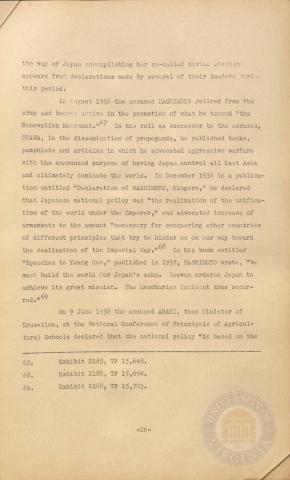
Page 26
| Parent | Japanese - German - Italian Collaboration |
|---|---|
| Date | |
| Language | English |
| Collection | Tavenner Papers & IMTFE Official Records |
| Box | Box 14 |
| Folder | Japan, Germany, Italy Collaboration and Introduction |
| Repository | University of Virginia Law Library |
the way of Japan accomplishing her so-called divine mission appears from declarations made by several of their leader? oturia? this period.
In August 1936 the accused HASHIMOTO retired from the
army and became active in the promotion of what he termed "the
Renovation Movement." 67 In his roll as successor to the accused, OKAWA, in the dissemination of propoganda, he published books, pamphlets and articles in which he advocated aggressive warfare with the announced purpose of having Japan control all East Asia and ultimately dominate the world. In December 1936 in a publica tlon entitled "Declaration of HASHIMOTO, Kingoro," he declared that Japanese national policy was "the realization of the unifica tion of the world under the Emperor," and advocated increase of armaments to the amount "necessary for conquering other countries of different principles that try to hinder us on our way toward
the realization of the Imperial Way." In his book entitled "Speeches to Young Men," published in 1937, HASHIMOTO wrote, "We must build the world for Japan1s sake. Heaven ordered Japan to achieve its great mission. The Manchurian Incident thus occur-*
red."6*
On 9 June 1938 the accused ARAKI, then Minister of Education, at the National Conference of Principals of Agricul-tural Schools declared that the national policy "is based on the
67. Exhibit 2185, TP 15,648
68. Exhibit 2188, TP 15,694
69. Exhibit 2188, TP 15,703
